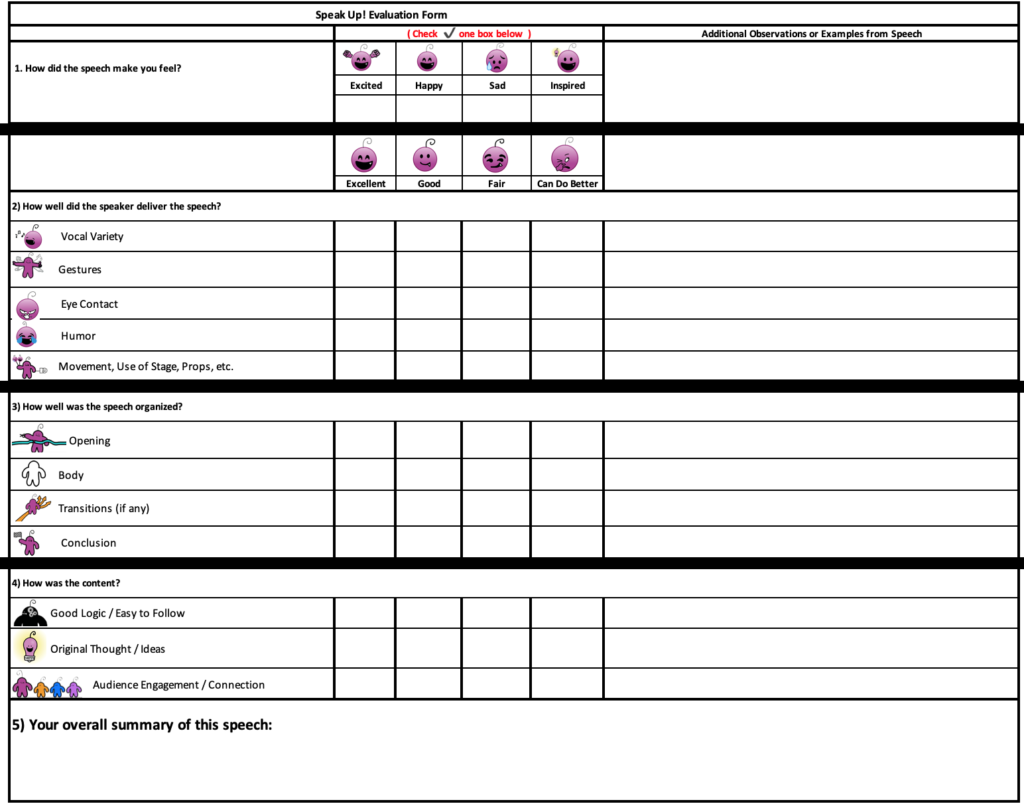Want to Be a Better Speaker? Evaluate Other Speakers!

When one is learning to improve at public speaking, or actually, most things, one essential part of the process is getting constructive feedback, which is also sometimes called constructive criticism.
In the words of one source, constructive feedback is “providing useful comments and suggestions that contribute to a positive outcome, a better process or improved behaviours. It provides encouragement, support, corrective measures and direction to the person receiving it.” With good constructive feedback, you can know exactly what your strengths are, and which aspects of your speech you should focus on working on in the future. With this information, you can use your strengths to your advantage, while simultaneously concentrating on focusing on improving your weaknesses.
An added bonus is that evaluation doesn’t only apply to learning public speaking- regardless of what you are trying to improve at, chances are that constructive feedback will help you improve! Personally, constructive feedback has helped me a lot, especially in school with things from essays to presentations to even math problems. It has also helped me with non-curricular activities, including things like learning to swim and draw!
Sometimes, you may be asked to give feedback on someone else’s speech rather than give your own speech, This situation can occur in non-public speaking-related places, too! That’s why it’s so important to learn how to give feedback that is not only kind, but helpful. But how does one do this?
To give valuable constructive feedback, there are a few things you must keep in mind. Here are the most important ones:
Observe the speech using DOC. When you evaluate a person’s speech, there are three main components that you need to carefully study as he or she gives the speech. These three components are Delivery, Organization and Content. By this I mean that you should look at how they delivered the speech (vocal variety, body language, etc.), the way they organized the speech (introduction, body, conclusion, etc.), and what content the speech included (whether it was interesting, informative, helpful, etc.).
Be considerate. The speaker has worked hard to give their speech! Be polite and keep the other person’s feelings in mind. Here are some sentence starters for giving good feedback:
- Excellent job on…
- Did you consider…
- You may want to add…

Get to the point. Even though it’s important to be thoughtful when giving your suggestions, don’t dwell on each point for too long. Make your point quickly.
Don’t be afraid to give suggestions-just make sure that you’re not being mean about it when you do. Also, if the speaker doesn’t already know and approve of you evaluating how they did prior to you doing it, make sure that the speaker wants to be evaluated. Don’t start telling someone everything they did right or wrong without making sure they want to hear it first.
Give examples. If possible, try including examples of each point you make. For example, if you thought someone could have said something a different way, don’t just say something like “You could’ve been more specific at some parts of your speech.” Instead, maybe try saying something more along the lines of “I really thought it was interesting when you included the point about —; however, I think it might’ve had a bigger impact on the audience if you had done —instead.”
Always remember to start your evaluation with the things that they did well or your compliments – It makes the speaker you are evaluating that much more open and receptive to your constructive feedback!
